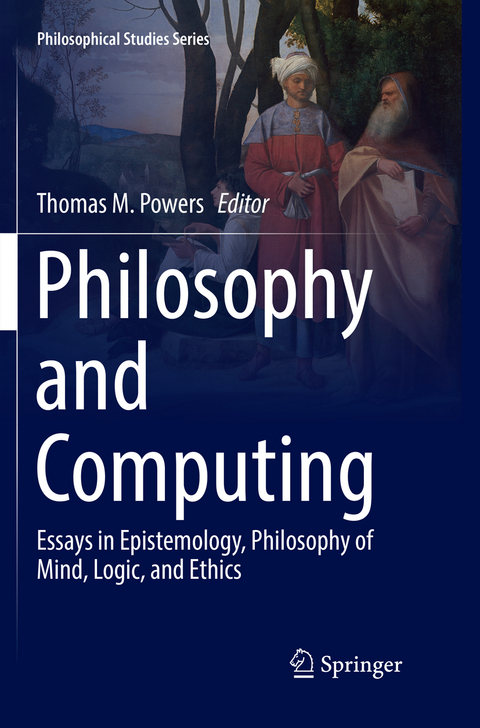
Philosophy and Computing
Springer International Publishing (Verlag)
978-3-319-86989-6 (ISBN)
This book features papers from CEPE-IACAP 2015, a joint international conference focused on the philosophy of computing. Inside, readers will discover essays that explore current issues in epistemology, philosophy of mind, logic, and philosophy of science from the lens of computation. Coverage also examines applied issues related to ethical, social, and political interest.
The contributors first explore how computation has changed philosophical inquiry. Computers are now capable of joining humans in exploring foundational issues. Thus, we can ponder machine-generated explanation, thought, agency, and other quite fascinating concepts.
The papers are also concerned with normative aspects of the computer and information technology revolution. They examine technology-specific analyses of key challenges, from Big Data to autonomous robots to expert systems for infrastructure control and financial services. The virtue of a collection that ranges over philosophical questions, such as this one does, lies in the prospects for a more integrated understanding of issues. These are early days in the partnership between philosophy and information technology. Philosophers and researchers are still sorting out many foundational issues. They will need to deploy all of the tools of philosophy to establish this foundation. This volume admirably showcases those tools in the hands of some excellent scholars.Thomas M. Powers is the founding director of the Center for Science, Ethics, and Public Policy at the University of Delaware. He holds appointments as Associate Professor in the Philosophy Department and the Delaware Biotechnology Institute. His research concerns ethics in science and engineering, the philosophy of technology, and environmental ethics, and his publications range from topics in artificial intelligence and robotic ethics to the ethical aspects of design. Powers received a B.A. in philosophy (College of William and Mary) and a Ph.D. in philosophy (University of Texas at Austin). He has been a DAAD-Fulbright dissertation-year fellow at the Ludwig-Maximilians-Universitat in Munich, a National Science Foundation fellow in the School of Engineering and Applied Science at the University of Virginia, and a visiting researcher (2015) at the Universite Pierre et Marie Curie, Laboratoire d'Informatique - Equipe: Agents Cognitifs et A pprentissage Symbolique Automatique.
Introduction: Situating Computing in Philosophy (Thomas M. Powers).- Chapter 1. Levels of Computational Explanation (Michael Rescorla).- Chapter 2. On the Relation of Computing to the World ( William J. Rapaport).- Chapter 3. Cognitive Computation sans Representation (Paul Schweizer).- Chapter 4. Software Error as a Limit to Inquiry for Finite Agents: Challenges for the Post-human Scientist (John F. Symons and Jack K. Horner).- Chapter 5. The Singularity Business: Toward a Realistic, Fine-grained Economics for an AI-Infused World (Selmer Bringsjord).- Chapter 6. Artificial Moral Cognition: from Functionalism to Autonomous Moral Agents (Don Howard and Ioan Muntean).- Chapter 7. AI and the Automation Of Wisdom (Shannon Vallor).- Chapter 8. An Analysis of Machine Ethics from the Perspective of Autonomy (Mario Verdicchio
).- Chapter 9. Beyond Informed Consent: Investigating Ethical Justifications for Disclosing, Donating or Sharing Personal Data in Research (Markus Christen, Josep Domingo-Ferrer, Dominik Herrmann, Jeroen van den Hoven).- Chapter 10. Big Data, Digital Traces and the Metaphysics of the Self (Soraj Hongladarom).- Chapter 11. Why Big Data Needs the Virtues (Frances S. Grodzinsky)."The volume is wide-ranging and rich, and contains much that cannot be covered in a single review. It should have something of interest to anyone working on contemporary philosophy of computers and computation." (Colin Klein,Notre Dame Philosophical Reviews, ndpr.nd.edu, May, 2018)
“The volume is wide-ranging and rich, and contains much that cannot be covered in a single review. It should have something of interest to anyone working on contemporary philosophy of computers and computation.” (Colin Klein,Notre Dame Philosophical Reviews, ndpr.nd.edu, May, 2018)
| Erscheinungsdatum | 08.02.2019 |
|---|---|
| Reihe/Serie | Philosophical Studies Series |
| Zusatzinfo | VI, 242 p. 4 illus. |
| Verlagsort | Cham |
| Sprache | englisch |
| Maße | 155 x 235 mm |
| Gewicht | 385 g |
| Themenwelt | Geisteswissenschaften ► Philosophie |
| Mathematik / Informatik ► Informatik | |
| Mathematik / Informatik ► Mathematik ► Finanz- / Wirtschaftsmathematik | |
| Schlagworte | Artificial Agents • Autonomous Moral Agents • computer ethics • Computers Epistemology • Computers philosophy of mind • Computers philosophy of science • Computers political unrest • Engineering Ethics • Machine agency • Machine ethics • Machine generated explanation • Machine thought • Philosophy of computing • Robots Big Data |
| ISBN-10 | 3-319-86989-2 / 3319869892 |
| ISBN-13 | 978-3-319-86989-6 / 9783319869896 |
| Zustand | Neuware |
| Informationen gemäß Produktsicherheitsverordnung (GPSR) | |
| Haben Sie eine Frage zum Produkt? |
aus dem Bereich


